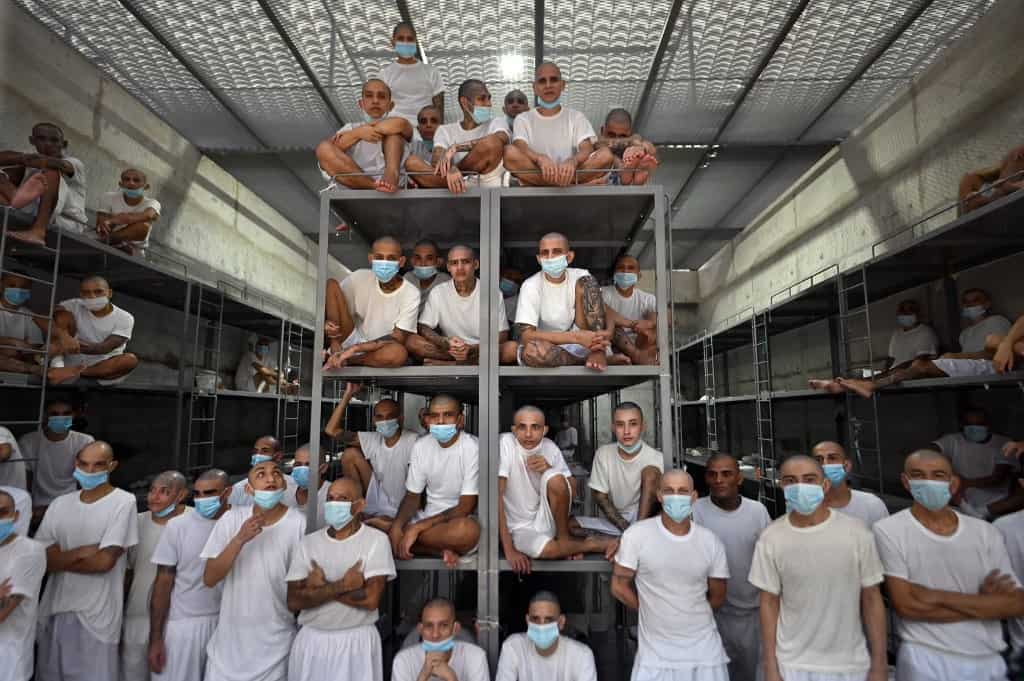“Here we are persevering day by day”: shaven-headed, sometimes tattooed to the head, more than 12,000 alleged gang members from El Salvador coexist in the mega-prison inaugurated by President Nayib Bukele as the flagship of his relentless war against the maras.
With capacity for 40,000 people, “the largest in America” according to the government, the prison located in Tecoluca, 74 km southeast of San Salvador, began receiving inmates six months ago, on February 24. The prison was visited on Monday by government human rights officials.
“Here we are persevering day by day, trying to change with the help of our God,” José Hurquilla Bonilla, from the Barrio 18 gang, manages to say from inside a cell.
Human rights organizations have questioned the treatment received by alleged gang members. The UN denounced that among the tens of thousands of detainees there are at least 1,600 minors.
Most of the prisoners are accused of belonging to the violent Mara Salvatrucha and Barrio 18 gangs, born on the streets of the US city of Los Angeles in the early 1980s.
“When you’re a kid, anyone lies to you and sweetens you, you make a mistake, and when you start growing up (…) you come to realize,” says Nelson Velásquez, a 37-year-old prisoner who has “MS-13” (Mara Salvatrucha) tattooed on his head.
Velásquez spoke during a visit by the Colombian Human Rights Commissioner of El Salvador, Andrés Guzmán, and the Human Rights Attorney, Raquel Caballero, to the mega-prison.
In each cell of about 100 square meters, between 60 and 75 inmates live together, with two toilets and two sinks with running water for cleaning, as well as two containers with drinking water.
With their hands tied, dressed like the rest of the prisoners in T-shirt, shorts and an impeccably white mask, Velásquez says he has already served two sentences for different crimes that added up to 15 years, but now awaits a new trial.
The pavilions of the prison have a curved roof that guarantees natural ventilation for the prisoners, in addition to skylights that filter sunlight into a courtyard that separates the cells.
The prison was built to hold some of the more than 72,000 gang members detained under a state of exception decreed in March 2022 by Congress at the request of Bukele, in response to an escalation of violence that claimed the lives of 87 people in just three days.
Of the total detainees “to date there are a little more than 7,000 who have been released,” the Security Minister, Gustavo Villatoro, reported this Tuesday.
To build the prison, the State bought 166 hectares, 23 of which were used to build eight pavilions that are within a perimeter surrounded by an 11-meter high concrete wall and 2.1 kilometers long, protected by electrified fences.
The food is not enough
After talking to inmates from different cells, the Human Rights Attorney, Raquel Caballero, said that the prisoners complained that there is not enough food.
“They complain that the food is not enough” and “that they are idle, they don’t do anything because they spend locked up,” said Caballero.
The prison has dining rooms, rest rooms, a gym and ping pong tables, but only for the guards’ use. There are also dark “punishment cells”, without windows, to punish inmates with bad behavior.
There are rooms for virtual judicial hearings so that prisoners do not have to leave the prison. They also cannot receive visits from family members.
During the visit to the prison, Commissioner Guzmán asked the inmates about their situation in the cells and most said that water “does not lack”, but they asked for brooms and detergent for cleaning.
A doctor stated that “daily” water samples are taken and sent to the lab to ensure quality. Other inmates are divided: some say they receive toothpaste, toothbrushes and soap on time, while others demand medication for those with terminal illnesses.
“There is much, much more work to do from a human rights point of view for them, but we are doing well,” said Commissioner Guzmán. He said the prisoners “are in decent conditions”.
The NGO Cristosal denounced 174 deaths of detainees under state custody upon the first year of the state of exception, which it described as “a permanent measure of repression and human rights violations.” The UN called for an investigation into these deaths.
The attorney assured that the prison has a medical team of 50 people including nurses and doctors.






